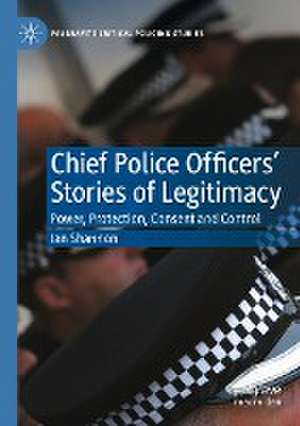Chief Police Officers’ Stories of Legitimacy: Power, Protection, Consent and Control: Palgrave's Critical Policing Studies
Autor Ian Shannonen Limba Engleză Paperback – 26 noi 2022
| Toate formatele și edițiile | Preț | Express |
|---|---|---|
| Paperback (1) | 418.45 lei 6-8 săpt. | |
| Springer International Publishing – 26 noi 2022 | 418.45 lei 6-8 săpt. | |
| Hardback (1) | 424.81 lei 6-8 săpt. | |
| Springer International Publishing – 25 noi 2021 | 424.81 lei 6-8 săpt. |
Preț: 418.45 lei
Nou
Puncte Express: 628
Preț estimativ în valută:
80.08€ • 82.01$ • 66.61£
80.08€ • 82.01$ • 66.61£
Carte tipărită la comandă
Livrare economică 18 martie-01 aprilie
Preluare comenzi: 021 569.72.76
Specificații
ISBN-13: 9783030858810
ISBN-10: 3030858812
Pagini: 254
Ilustrații: IX, 254 p.
Dimensiuni: 148 x 210 mm
Greutate: 0.35 kg
Ediția:1st ed. 2022
Editura: Springer International Publishing
Colecția Palgrave Macmillan
Seria Palgrave's Critical Policing Studies
Locul publicării:Cham, Switzerland
ISBN-10: 3030858812
Pagini: 254
Ilustrații: IX, 254 p.
Dimensiuni: 148 x 210 mm
Greutate: 0.35 kg
Ediția:1st ed. 2022
Editura: Springer International Publishing
Colecția Palgrave Macmillan
Seria Palgrave's Critical Policing Studies
Locul publicării:Cham, Switzerland
Cuprins
1 Introduction.- 2 Legitimacy: A Contested Concept.- 3 Chief Police Officers’ Backgrounds and Motivations.- 4 Protecting People, Particularly the Most Vulnerable.- 5 Policing by Consent.- 6 Law and Governance.- 7 Conclusion.
Recenzii
“Ian Shannon’s book Chief Police Officers’ Stories of Legitimacy joins the list of ‘must-read’ books for those interested in police leadership and police leaders. … A carefully crafted and well written book provides readers with a comprehensive overview of what we already know about police leadership and police leaders. … The research will be of great interest to all police scholars and to those who care about the quality of policing and civil liberties.” (Marisa Silvestri, Policing and Society, May 29, 2022)
Notă biografică
Ian Shannon is a fellow at the University of Leeds, UK, and completed his PhD at the University of Liverpool in 2018. From 1981 to 2013, he served as a police officer in three forces and he retired as a deputy chief constable. He was awarded the Queen’s Police Medal in 2013.
Textul de pe ultima copertă
"An important assessment of how chief police officers understand and use power and what this might mean for the maintenance of legitimacy. From an academic and practitioner perspective, Shannon paints a disconcerting picture of the conflict that arises when chief police officers consider policing by consent and the need to need to exercise power based on the law."
–Jenny Fleming, Professor, Social Sciences, University of Southampton, UK
This book adds to knowledge about chief police officers in England and Wales by exploring their understandings of the right of police to exercise power. Their beliefs, motivations, backgrounds, and cultures are examined. Light is cast on how they perceive power, coercion, control, policing purpose, gendered understandings, protecting people, vulnerability, policing by consent, discretion, operational independence, law and the oversight and political direction (or governance), and accountability of police.Chief officers used three legitimating narratives based on: protecting people — particularly the most vulnerable — policing by consent, and law and the oversight and political direction of police. These accounts are assessed. Damaged processes of police governance that risk undermining police leadership and legitimacy are revealed. Critically, chief officers’ understandings of legitimacy are found to be confused, conflicted, and, above all, convenient in supporting them in asserting a privileged position from which they can pursue their preferences for the use of power. Ian Shannon is a fellow at the University of Leeds, UK, and completed his PhD at the University of Liverpool in 2018. From 1981 to 2013, he served as a police officer in three forces and he retired as a deputy chief constable. He was awarded the Queen’s Police Medal in 2013.
Caracteristici
Examines the concept of legitimacy through the accounts of chief police officers Critically assesses their understanding of their right of police to exercise power Complements the highly quantitative focus of the recent procedural justice literature













